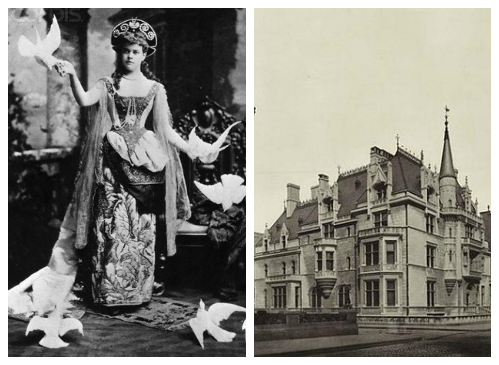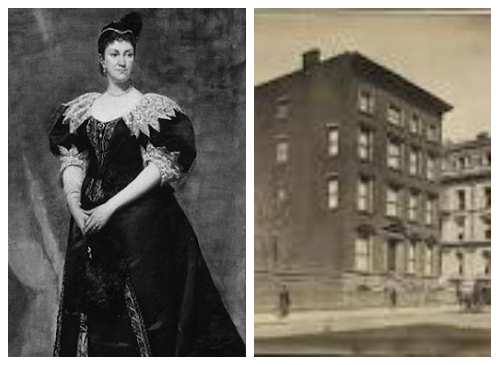The Rise of the American Socialite
by
Jen Turano
Author of
After a Fashion
Bethany House
**********
In the spirit of biding a fond farewell to season five of Downton Abbey, I thought it might be fun to travel back in time a few decades before Downton and visit the circumstance that allowed that marvelous show to be created in the first place – the rise of the American Socialite and Heiress.
Before the Civil War, (1861-1865) high society in the United States consisted of a select group of well-established families, these families having secured their fortunes through land ownership, banking, and slavery. After the Civil War, however, things began to change dramatically in the United States. The war had transformed the North into one of the most heavily industrialized regions in the country, allowing men of business to reap unprecedented wealth. With that wealth came a desire to be accepted into high society, and that, dear friends, is when the trouble began.
Caroline Astor and her original brownstone
Old society, or Knickerbockers as they were known, were appalled by the nouveau riche flocking into New York City, flashing their money around and disrupting a system that had been in place for years. Something had to be done, and that something was entrusted to none other than Mrs. William Astor, known as Caroline (or Lina) to her intimates and the Mrs. Astor to everyone else. She’d married one of the richest men in America and for a time, was content to live a relatively quiet life as she raised her children. But, when her children began coming of age, Caroline needed to ascertain they would marry only the right people, and that’s exactly why she agreed to take society in hand. With the help of Ward McAllister, one of the most snobbish gentlemen to ever grace the country, Caroline began creating a plan. The brilliance of Caroline’s plan centered around the idea that she didn’t snub all members of the newly rich, but picked the most desirable of the bunch and even gave them a new title – “Swells.” She then renamed old society members “Nobs” and insisted everyone get along. She did not include newly-moneyed people easily, though, and even went to the extreme bother of creating a list that included only 400 people on it – a list that eventually became known as the New York 400 (rumor has it there were 400 people on the list because only that number of people could fit into the ballroom of Caroline’s oh-so-proper brownstone.) Content with the idea that she now had society well in hand, Caroline settled into ruling that society, but there was rising discontent from the very rich who’d been excluded from society and it was only a matter of time before a revolt occurred.
Enter Mrs. William K. Vanderbilt.
After a Fashion
After years of working in a millinery shop, Miss Harriet Peabody dreams of the day when she’ll open up her own shop and sell re-fashioned gowns to independent working women like herself. When a delivery errand goes sadly awry, her job–and her chance at saving enough for her shop–is at stake all due to a rather unfortunate misunderstanding with a customer.
Mr. Oliver Addleshaw enjoys a certain position in society, but his real aim is to follow in the footsteps of men like Cornelius Vanderbilt. On the verge of his biggest business deal yet, he learns his potential partner prefers to deal with men who are settled down and respectably married. As matters stand, Oliver’s ex not-quite-fiance recently became unhinged and lost a poor shop girl her job. Oliver feels bad for the hapless Harriet and, hoping to kill two birds with one stone, asks for her help in making a good impression in his business deal.
Alva Vanderbilt was born into a wealthy southern family, and from all accounts, she was a terror in her youth. When her family lost their fortune during the Civil War, Alva decided there and then that she didn’t enjoy being poor and set out to find a rich husband. She was successful in that endeavor and married Mr. William K. Vanderbilt, grandson of the notorious Commodore Vanderbilt, and heir to one of the largest fortunes in the country. Nonetheless, even with an enormous fortune behind her, Alva was not welcomed into New York high society, her way blocked by none other than Caroline Astor.
Up until this point, Caroline had been remarkably successful keeping people she felt were undesirable at bay, but she’d never been faced with someone like Alva before. Alva was still a bit of a terror, and she was consumed with a desire to become one of the leaders of New York Society. Filled with this ambition, she set about the daunting business of thwarting her nemesis. She hired Richard Morris Hunt, an esteemed architect of the times, to build her a beautiful mansion at 660 Fifth Avenue. This mansion put Caroline’s rather ugly brownstone to shame, which I’m quite sure was Alva’s intention all along, and then…Alva planned the ball of the decade.

Alva Vanderbilt and her 5th Avenue mansion
She was very strategic in the planning of this ball, hosting it on March 26, 1883 – a date that was carefully selected because it was actually after the normal closing of the New York City social season. Most high society members would have been packing up to leave the city for foreign countries at this time, but because Alva’s ball was certain to be the extravagant event of the year, everyone stayed. Alva also decided to host a costume ball, and the costume theme sent people into a frenzy as they commissioned designers to create what they hoped would be the most spectacular costumes at the ball. Then, with all the excitement building, Alva played her trump card – Miss Carrie Astor, daughter of Caroline, had been diligently practicing for one of the many cotillion dances that were to be held during the Vanderbilt ball. I’m sure Alva was rubbing her hands in glee when she had to, much to her delight I’m certain, inform the powers that be that because Caroline Astor – the leader of society – had never paid a call on her, it just wouldn’t be proper or acceptable for her to extend an invitation to the Vanderbilt lavish ball to any member of the Astor family.
Caroline had no choice but to pay a visit to Alva – although it is said she never left the comfort of her carriage, simply sent her driver up to Alva’s house to leave one of Caroline’s calling cards, but that was sufficient. Alva was, from that moment forward, accepted into society, and with that acceptance she then paved the way for more American heiresses to claim their spots within society.
What does any of this have to do with Downton Abbey, you ask? Well, many of these wealthy, newly accepted society-mothers, (Alva included of course,) began to aspire to far greater achievements than to simply be a part of American high society. They wanted titles attached to their names which they believed would cement their respectability once and for all. They began to visit England on a regular basis, and by the time they were finished marrying their daughters off, and paying handsomely for the honor of a title in the process, over two-hundred American heiresses had traveled across the ocean.
This marrying off of American heiresses lasted until about the beginning of World War I, but after the war, many English gentlemen had lost their lives, leaving the pickings rather slim. America was also having a bit of a mind-change regarding titles, and because of this, American heiresses began staying on their side of the Atlantic, closing a fascinating chapter in history.
Thanks Jen!













March 23, 2015 at 7:44 pm
I think I need to side with America and be loyal. Although I do love Enlgish accents!
March 23, 2015 at 8:21 pm
I think I would have to be American 🙂
March 23, 2015 at 10:24 pm
An American Socialite.
March 24, 2015 at 12:53 am
Thanks for the informative blog. I’d love to read your book!
March 24, 2015 at 12:56 am
I think an American Socialite.
March 24, 2015 at 1:20 am
Wow what an interesting story. I wouldn’t mind reading more about that era and society.
March 24, 2015 at 1:40 am
I’m not a very social person. I would hope I’d have enough freedom with my money to spend it on whatever or whoever I liked (helping people)
March 24, 2015 at 1:40 am
I think I’d rather be an American Socialite. It seems they would have more of an opportunity to travel and see the world (even if it is just to get married off :)).
March 24, 2015 at 2:08 am
I absolutely loved reading your post.It was so fascinating.I am very interested in this time period and reading more about it.I would definitely choose to be an American socialite.It would be fabulous to marry rich and travel ! This book has such a sense of humor.I really would love to readit !
March 24, 2015 at 2:10 am
Very interesting story!
March 24, 2015 at 2:11 am
I find Gilded Age America fascinating. Just a very unique time period in our history, like Jen says. And her book sounds very interesting! I’ll have to make time for this one. 🙂
March 24, 2015 at 2:12 am
Forgot to add, I’d definitely rather be an American socialite than English gentry! How could I pick otherwise? 😀
March 24, 2015 at 2:23 am
An American socialite.
And thank you for a great bit of history.
March 24, 2015 at 2:29 am
Hmm, tough choice! I think the American side had more freedom, so I would choose that. 🙂
March 24, 2015 at 2:42 am
That’s a tough question. I think I might have to go with English gentry. I can’t really put my finger on a reason though.
Also, I really like Edith Wharton’s The Buccaneers (though she didn’t live long enough to complete it). It’s all about a group of American girls going to England to get titles.
March 24, 2015 at 3:22 am
How interesting! I love learning more about history, but in all honesty, I would have to say that I don’t know which choice I’d make…Most likely American, although being part of the English gentry does hold some appeal. 🙂
March 24, 2015 at 4:07 am
Gosh, that’s a tough question. I think maybe the English gentry but I’m not sure why. Maybe it’s the “Jane Austen”-esque part of it lol.
March 24, 2015 at 4:29 am
I think I’d rather be an American socialite. Wouldn’t want an ocean separating me from my family. On second thought…that may not be such a bad idea – HA! HA! Thanks for the opportunity to win this book. I’ve read all of Mrs. Turano’s books and they are fabulous! Looking forward to hunkering down with this one as well.
March 24, 2015 at 4:51 am
This is fascinating! Thank you for sharing it with us all! I’m not sure whether I’d like to be English Gentry or American Socialite. I think I’d have to undergo a personality change and become more outgoing for either one. Maybe, as long as I had the money, I could be an eccentric lady of quality that moved comfortably in any circle? 😀
March 24, 2015 at 5:23 am
I absolutely love historical fiction novels. Haven’t read this one yet, but it looks fun. Hmmmm. It is hard to make a decision English between English gentry or an American socialite. I like them both. 🙂
March 24, 2015 at 5:34 am
I would like to be an American Socialite. I have seen some of the Gold Coast Mansions from the time. Those were the days for sure!
March 24, 2015 at 12:56 pm
I’m pretty much a loyal American, so I imagine, I’d be more comfortable as an American socialite.
March 24, 2015 at 1:10 pm
Thanks for the chance to win!!
March 24, 2015 at 2:40 pm
American Socialite, because I am American after all…lol! Great blog post, enjoyed reading it…been wanting to read this book, thanks for the chance to win it!
March 24, 2015 at 4:29 pm
I would pick American socialite because they appear to be more exciting.
March 24, 2015 at 5:22 pm
Either because both sound interesting.
March 25, 2015 at 2:09 am
An American socialite – too much drama on the English side – love it but wouldn’t have wanted to be a part of it!
March 25, 2015 at 2:18 am
What a fascinating piece of history! Thanks for sharing!
I’d probably rather be an American socialite – seems to me the social rules were probably a little less restrictive.
March 25, 2015 at 2:19 am
This was so interesting! Even though I’ve always been a bit in love with the idea of the English gentry, I can’t imagine ever being anything other than an American-it’s in my heart.
March 25, 2015 at 7:38 am
I would rather have been an American socialite. I think they would be more fun. Also, I like America better. Would sure love to win Jan’s book. Sounds so good. Sounds like these two ladies could have a good cat fight. LOL Maxie
March 25, 2015 at 11:44 am
I think I would have been an American socialite. Thanks for an informative post.
Connie
March 25, 2015 at 12:02 pm
I think being an American socialite would be my choice. I don’t really have a reason other than I was born here and feel a strong loyalty to the USA.
March 25, 2015 at 12:29 pm
Since I’m an American, I’d rather have been an American socialite than English gentry.
March 25, 2015 at 1:17 pm
In days gone by, would you have rather been part of the English gentry or an American socialite? That’s a harder question after thinking about it. I’m going with English gentry, because I’ve read more books in that genre and it more fantastical to me.
March 26, 2015 at 12:18 am
I would rather have been an American Socialite. I think the English would have had too many rules.
March 26, 2015 at 12:55 am
American. Not as restricted and all those English men would think I was something rare and special.
Interesting about Nobs and Swells.
March 26, 2015 at 10:03 am
American Socialite, then you could be like Cora on Downton Abbey and marry into the English gentry
March 27, 2015 at 5:52 am
Previously, I would have said English gentry, no contest … American socialite makes me think of Paris Hilton or Kim Kardashian. However after this article –it depends on the time period. Regency era – definitely English, but afterwards, American socialite! =)
March 27, 2015 at 5:56 am
Oops, forgot to add this is Zekkaina on rafflecopter. =)
March 29, 2015 at 4:13 pm
Both sound like so much work to uphold your standing in society! An American socialite to be patriotic… 🙂